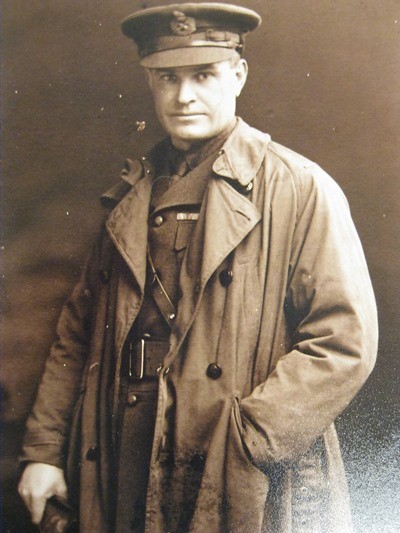On 21-22 September this year, a Young Historians Workshop was held at the State Library of Queensland. Sponsored by the State Library and the Queensland History Teachers’ Association, the workshop was themed around the First World War.

Young Historians' Workshop 2015 staff and students
Sessions included a tour of the library, a look at various history databases and other online resources, a demonstration of the QANZAC100 Historypin hub and this WWI Centenary blog. Also included was a White Gloves experience, so the students could see and handle original manuscripts and WW1 collections from 100 years ago.
Library staff worked with students over the two days, helping them to develop a range of research skills as they investigated topics of interest to them. The students learned how to utilise State Library’s unique collection of First World War resources and Queensland heritage material to uncover some of the untold stories of the past, and were encouraged to share their discoveries.

Students researching WWI topics in the John Oxley Library
Students who participated in the workshop said they were amazed by the wide variety of historical documents and other sources they had not known were available, including original artefacts from the war, discovered during a White Gloves experience. They also appreciated having the opportunity to work with a staff mentor and explore the library, including the repository where much of State Library’s collection is housed.

Young Historians in the State Library repository
In one of the workshop sessions, staff and students explored different ways of presenting their research or completing their assignments, and giving their presentations a creative edge. Students were encouraged to share their learnings, and one of the student participants, Meghan Malone, spent time researching the aftermath of World War 1 and how it led to the outbreak of World War 2, and decided to write her assignment in the form of an imaginary letter from Major-General William Glasgow to the editor of a newspaper, offering an opinion on the Treaty of Versailles. Read Meghan's introduction and letter below:

Major William Glasgow at Gallipoli, 1915 (John Oxley Library Accession 29571)
Sir Thomas William Glasgow (1876-1955), soldier, politician and diplomat, was born on 6 June 1876 at Tiaro, near Maryborough, Queensland. In March 1916 when the 4th and 5th Divisions were formed, Glasgow was promoted temporary brigadier and given the task of raising and commanding the 13th Infantry Brigade. He led his men in many important actions including those at Pozières, Messines, Passchendaele, Mouquet Farm and Dernancourt. After the war he became an advocate for the rights of soldiers, though he deprecated extravagant claims to privileges. In 1919 Sir William Glasgow was elected to the Senate as a Nationalist. He was no orator but his rugged common sense was appreciated and he quickly made his mark in Melbourne. This completely fictional letter focuses on post-war issues that may well have drawn the attention of this significant figure of WWI and its aftermath.

William Glasgow during World War I. John Oxley Library Acc: 29571
Date…..
Dear Mr Editor,
My name is Sir William Glasgow and as you are no doubt aware, I served as a Major-General (Brigadier) on the battle fields of Gallipoli in 1915. I feel well-informed to comment on the horrors of the Great War and its consequences on our immerging nation. I was greatly shocked to hear of the proposal of a so-called, “Peace Treaty”. This Treaty of Versailles, in my opinion, seems a drastic measure indeed and I was most surprised to hear of the treaty being signed by representatives of the German nation. The recent endorsement of this Treaty by your hitherto respectable publication has disturbed me greatly and I felt the need to publicly condemn the consequences of the sanctions that will be placed on Germany.
The treaty was signed on the 28th September, 1919 (some weeks ago now) in the Versailles Palace, Paris. The intentions of such a document are honourable, namely to ensure infinite peace, guarantee economic security and eliminate the possibility of another war as devastating as the Great War. It is impossible however for such a treaty to ever be effective. The economic effects that the sanctions will have on Germany will result in the decimation of the nation and confirm that this is a ‘treaty’ in name only.
In order to fulfil the conditions of the treaty, Germany will be put under a huge economic strain. The treaty demands that Germany pays massive reparations yet also takes away from them large amounts of external territory to be given to Britain and France. The loss of territory in the Pacific, Alsace-Lorraine, Poland and Africa most particularly means a great decrease in revenue Germany can produce. As has been the case in our own alliance, Germany and its allies have lost untold numbers of good, brave men. This has significantly decimated Germany’s labour force which will make it even more impossible for them to generate the necessary revenue. A nation in such a deficit will most certainly decimate the quality of life for every man woman and child in Germany. Conditions such as those that have been placed on Germany are bound to result in hysteria.
Whilst Germany suffers, France and England will greatly benefit from the additional colonies they have obtained. Our own Prime Minister, Mr W. M. Hughes, stated not long after the signing of the treaty, “The solution regarding the German possession in the Pacific will ensure Australian national security,” however I do not believe that the decision to remove Germany’s external territory was made for Australia’s benefit. Indeed it was done with the intention of obtaining more land and more profit for the victorious allies without a thought for the causes of the Great War, these being imperialism and jealousy.
I cannot help but speculate what sanctions would have been placed against the Allies by a victorious Germany had we been unfortunate enough to lose the Great War. Administered in reverse, these cruel conditions would result in destruction of the lifestyle and values we hold so dearly. We must surely therefore show compassion for the results that the cruel conditions that the Treaty of Versailles will have on our former enemies.
I fear this treaty will also be detrimental to the goal of ongoing future world peace and will instead result in further tension and disharmony among the nations of the world. All I can do is hope that little by little the citizens of our great nation realise the faults that lie within the Treaty of Versailles and pray that common sense, foresight and compassion will prevail and a more suitable solution can be found to maintain world peace.
Yours with concern,
Sir William Glasgow.
Comments
Your email address will not be published.
We welcome relevant, respectful comments.